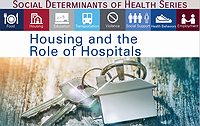AHA/HRET Guides
Social Determinants of Health Series: Housing

“Housing and the Role of Hospitals” is the second guide released by the AHA, HRET and ACHI as part of a series on how hospitals can address the social determinants of health.
What is housing instability?
Each year, there are 1.48 million homeless individuals in the United States. In addition, some individuals are not homeless but live in unstable conditions. Housing instability—a term for the continuum between homelessness and stable, secure housing—can range from physical conditions such as poor sanitation, heating and cooling; exposure to allergens or pests; and substandard housing structures. Unstable access to housing and severe rent burden also contribute to housing instability.
How is housing instability related to health?
Where people live and how people live directly affect their well-being. Research shows that individuals experiencing housing instability have limited access to preventive care and are more likely to have infectious diseases and chronic health conditions like diabetes, cardiovascular disease and chronic obstructive pulmonary disease. Homeless individuals also have a shorter lifespan. This guide highlights a web of socio-economic factors that are interconnected, contribute to housing instability and influence health outcomes.
What is the role of hospitals in addressing housing barriers? Hospitals and health systems can implement strategies and programs to improve housing stability, such as neighborhood revitalization, home assessment and repair programs, and care transition programs. This guide recommends a step-by-step pathway for hospitals to consider when developing housing programs. The guide also features five case studies on hospitals and health systems with innovative interventions to reduce housing barriers in their communities.
- Bon Secours Baltimore Health System developed more than 700 affordable housing units for individuals and families in need.
- Children’s Mercy Kansas City’s Healthy Homes program offers environmental health assessments and repairs and renovations to improve housing stability in the community.
- St. Joseph Health, Humboldt County, in California, has a medical respite program for chronically homeless individuals who have been recently discharged from the hospital.
- St. Luke’s Health System and Saint Alphonsus Health System are developing a single-site Housing First program in Boise, Idaho, part of a collaboration with the city and local organizations.
- University of Illinois Hospital & Health Sciences System is partnering with the Center for Housing and Health in Chicago to provide stable housing and supportive services to homeless individuals.
Download “Housing and the Role of Hospitals” below.
Watch the story behind St. Joseph Health’s, Humboldt County, medical respite program here, narrated by Joy Victorine, program manager, care transitions.
View an archive of the Housing and the Role of Hospitals webinar here.
View additional resources on housing from H&HN.
Download “Food Insecurity and the Role of Hospitals,” the first guide in the series.
Upcoming guides in the social determinants of health series:
- Transportation
- Education
- Health behaviors
Additional Resources
Equity of Care Webinar SeriesPart 2: Aligning Diversity and Inclusion, Community Engagement, Busi......
VIEW THIS RESOURCEEquity of Care Webinar SeriesPart 1: Aligning Diversity and Inclusion, Community Engagement, Busi......
VIEW THIS RESOURCETransportation and the Role of Hospitals This AHA webinar on “Transportation and the Role of Hos......
VIEW THIS RESOURCE

